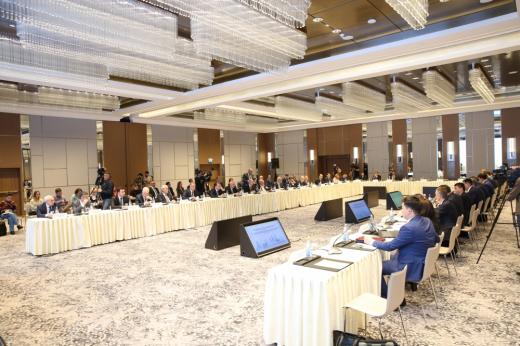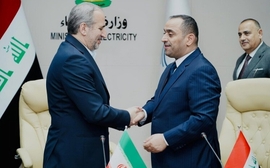Azerbaijan and Kazakhstan, two Caspian littoral states, are moving forward with their plans to increase bilateral trade.
Senior representatives from the two nations met in Baku on Friday, highlighting the potential to diversify their economies beyond the oil and gas sectors.
Speaking at the 19th meeting of the Azerbaijan-Kazakhstan Intergovernmental Commission, Deputy Prime Minister and Minister of Trade and Integration Serik Zhumangarin emphasized the importance of developing trade cooperation between Azerbaijan and Kazakhstan.
“The trade turnover between our countries at the level of $400-500 million per year,” Interfax quoted Zhumangarin as saying during the meeting. “It is a very low volume.”
During the talks, the Kazakh official pointed out the tremendous potential for Azerbaijan and Kazakhstan to deepen their economic ties and benefit from increased trade.
“We have prepared a list of over 100 items totaling $300 million that we offer for sale in the Azerbaijani market. In addition, we have prepared and submitted to the Azerbaijani side specific proposals on potential cooperation projects, as there is great potential for cooperation in this direction,” Zhumangarin added.
Touching upon the importance of trade relations, Minister of Energy of Azerbaijan Parviz Shahbazov said that the trade turnover between Azerbaijan and Kazakhstan increased by more than 4.4 times and reached $598 million.
The minister noted that relations between Azerbaijan and Kazakhstan are strengthening thanks to the political will of the heads of the two countries.
The energy minister recalled the “Comprehensive Program on the Development of Cooperation between the Republic of Azerbaijan and the Republic of Kazakhstan for 2022-2026” signed during the visit of Kazakh President Kassym-Jomart Tokayev to Azerbaijan. Signed by both presidents last August, the program represents the biggest joint initiative aimed at cementing the mutual relationship in multiple sectors.
Shahbazov also emphasized the transportation sector as one area of potential cooperation between the two countries. Azerbaijan and Kazakhstan are strategically located on the shores of the Caspian Sea and have rail networks that connect them to Europe and China, respectively. The two Caspian nations have the potential to develop and improve the transportation infrastructure to increase trade between them and facilitate the transit of goods to other regions.
The key focus of the cooperation in transportation and logistics is leveraging the Middle Corridor and integrating the Zangazur multi-modal route into it. Realization of the corridor’s full potential is expected to contribute to increasing the bilateral trade turnover.
The Trans-Caspian East-West Corridor, known shortly as the Middle Corridor, is crucial to reviving the ancient Silk Road. It traverses on rail and road routes across Georgia, Azerbaijan and the Caspian Sea and continues toward China on the Turkmenistan-Uzbekistan-Kyrgyzstan and Kazakhstan routes. The Baku International Sea Trade Port (Azerbaijan), Aktau/Kuryk ports (Kazakhstan) and Turkmenbashi port (Turkmenistan) are the main maritime chunks of the multimodal transport corridor. The Middle Corridor promises even bigger benefits to the landlocked countries in the region.
The Middle Corridor is more economical and faster compared to the Northern Corridor as a trade route between Europe and Asia and shrinks the travel distance by 2,000 kilometers. The Middle Corridor also runs through more favorable climate conditions and shortens the travel time by 15 days compared to the sea route.
Furthermore, the Middle Corridor offers great opportunities for cargo traffic in Asia so that the loads can reach the Middle East, North Africa and the Mediterranean region by integrating the port connections in Türkiye.







 The Islamic holy month of fasting, Ramadan comes to an end this week with the celebration of a joyous festival called Eid (meaning “festival” in Ar...
The Islamic holy month of fasting, Ramadan comes to an end this week with the celebration of a joyous festival called Eid (meaning “festival” in Ar...
 On the night of April 7 to 8, 1992, a peaceful Azerbaijani village, Aghdaban, located in the Kalbajar district, became the scene of a harrowing tra...
On the night of April 7 to 8, 1992, a peaceful Azerbaijani village, Aghdaban, located in the Kalbajar district, became the scene of a harrowing tra...
 On International Day for Mine Awareness and Assistance in Mine Action on April 4, the Azerbaijani government emphasized the persistent menace of la...
On International Day for Mine Awareness and Assistance in Mine Action on April 4, the Azerbaijani government emphasized the persistent menace of la...
 Iran's senior military leaders described the drone and missile attack on Israel on April 14 night as “successful".
Iran's senior military leaders described the drone and missile attack on Israel on April 14 night as “successful".



